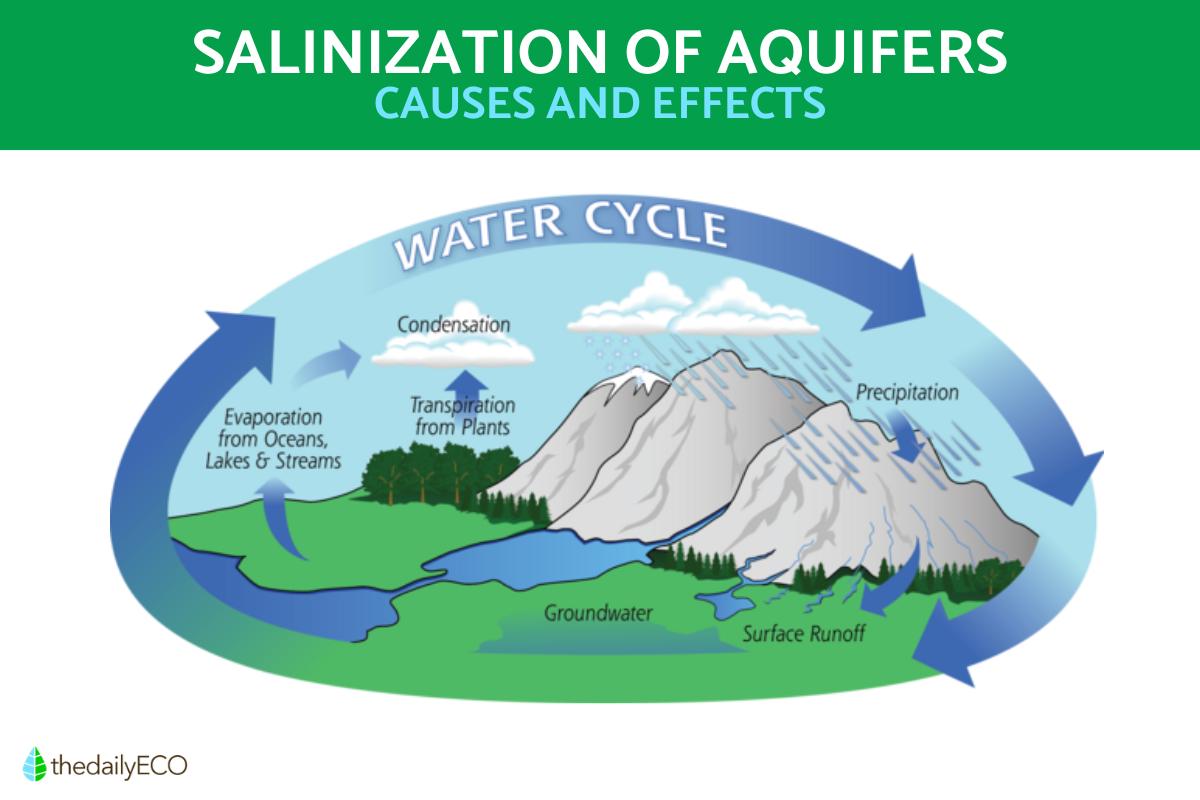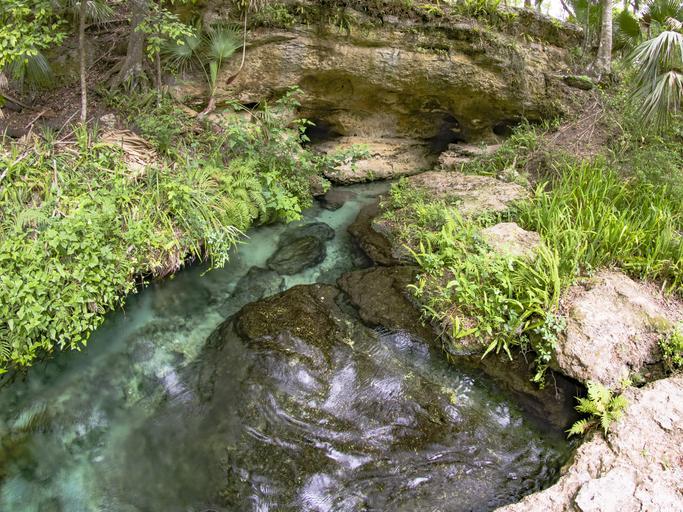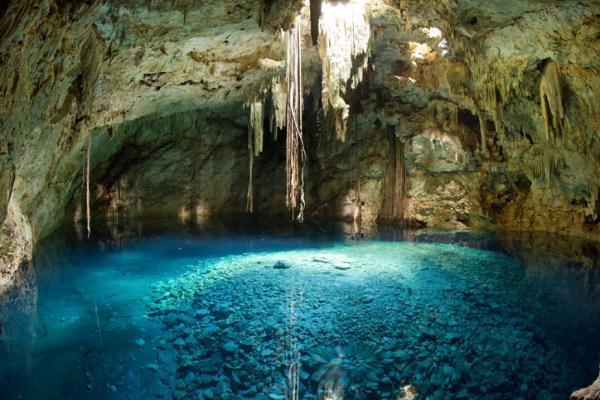Salinization of Aquifers - Saline Aquifer Causes


The salinization of aquifers is when these freshwater groundwater reservoirs become saline, i.e. water that has more dissolved salts than fresh water should contain. Aquifers contain much of the world's water resources since they often contain salt water which we can use for drinking and many other purposes in human civilization. They can also contain salt water, but this is less useful to us. Since the water in aquifers is a finite resource, we need to protect it. Salinization of aquifers is a threat to the quality of the water and, therefore, a threat to our survival. Unfortunately, it is a complex issue which often involves human actions in ecosystems.
At thedailyECO, we look at the different saline aquifer causes. We discover why salinization takes places in these groundwater reservoirs and what we can do to protect them.
What is salinization of aquifers?
The salinization of aquifers can be defined as the process by which the concentration of salts and minerals in groundwater increases, deteriorating its quality parameters. This process is considered a type of soil and water pollution that most affects coastal aquifers.
Under normal conditions, in aquifer geological formations the fresh water reserves remain in contact with the salty sea water. Both water masses maintaining a certain balance in their relationship. There are certain causes which can trigger or accelerate salinization processes. These can be of a natural origin, but they are increasingly anthropogenic.
Due to the tourist, agricultural, urban and population pressures that coastal ecosystems endure, the coastlines of many countries are presented with the serious problems of aquifer salinization. Taking the coast of a country like Spain, it is estimated that of a total of 95 existing underground water bodies, around 56 have salinization problems.
Learn more with our article on the different types of aquifers.

Salinization of aquifers causes
As noted in the previous section, the reasons why salinization of water in aquifers occurs can be of natural or anthropogenic origin. While certain natural processes can lead to a higher salinity of groundwater, human action in various ecosystems is triggering this process unnecessarily. We look at why salinization of aquifers is occurring:
Natural causes of aquifer salinization
- Weather changes: one of the most important sources of water entering aquifers is precipitation. Taking this into account, it is reasonable to think that irregularities in rainfall may favor the salinization of their reserves. For example, in periods of drought or in regions with dry climates evapotranspiration is greater than annual precipitation. In this case the accumulation of salts and minerals in the water can increase.
- Changes to terrain: salinization can also be favored by the lithology and physical-chemical characteristics of the terrain (texture, porosity, permeability, moisture retention and cationic exchange capacity). In this sense, when rainwater runs through saline soils, it is capable of dragging and transporting salts and minerals that end up being incorporated into the mineralogical composition of underground water reserves.
- Other natural factors: these causes of saline intrusion in aquifers include the influence of nearby saltwater aquifers, the proximity of lowlands to the coast, swamps and erosion of coastal lakes.
Anthropic causes of aquifer salinization
- Overexploitation: the overexploitation of aquifers stands out as the main trigger of their salinization. With the capture of large volumes of groundwater, water reserves are reduced. This causes a decrease in the water table and the lateral displacement of the saline wedge inland. This saline wedge is when fresh water interacts with salt water in coastal regions, so moving further inland can affect fresh water aquifers.
- Climate change: this can also be pointed out as a causal factor. Global warming accelerated by humans has caused the melting of glaciers, translating this into an increase in sea level. With each passing year, this increases the degree of threat to the state of vulnerability of coastal aquifers.
- Weather: anomalies in rainfall as a result of the current climate crisis can affect water salinity. This is due to a combination of periods of drought and periods of torrential rain downpours. These factors can cause large amounts of rain to runoff into the sea before they can be absorbed by the land, reducing groundwater storage in aquifers.
- Soil sealing: in addition to climate change causing greater runoff into the sea, infrastructure such as buildings and roads seals the soil and prevents the absorption of rainfall into aquifers. This seriously hinders the water recharge capacity of aquifers.
- Brine discharges: these are a product of seawater desalination activities, generating serious effects on aquifers and wetlands. These processes usually use either reverse osmosis or thermal distillation methods. Highly concentrated brine discharges are a resultant byproduct which is can enter the ground when being disposed. Discover more about how wetlands are formed in our related article.
- Water extraction: aquifer salinization can gain greater speed in those cases in which there is a mass of salt water below the fresh water. This is either because it was already there (salt water aquifer) or because it has penetrated from the sea in the form of a saline wedge. By extracting water, the hydraulic potential decreases and a vertical hydraulic gradient is generated that favors the rise of salt water.
Learn more about how freshwater is stored away from coastal regions with our article on what are inland waters?

Effects of aquifer salinization
Now we know the causes of the salinization of aquifers, it is worth asking about the effects on nature and human civilization that arise from this phenomenon. Below are the negative consequences of the salinization of aquifers that are considered to be most significant:
- The worsening of water quality generates health, social and industrial and domestic infrastructure problems, since salt acts as a corrosive agent.
- The saline stress caused in the vegetation leads to physiological and biochemical changes that compromise its survival and that of other living beings for which it is a source of food.
- In relation to the latter, agriculture is so threatened that 40% of Europe's supply of winter vegetables is at risk [2]. However, agriculture is not an exception. There are also many difficulties that can intervene in the normal development of other socioeconomic activities.
Discover more about how fresh water can become salinized with our article on what is brackish water?
If you want to read similar articles to Salinization of Aquifers - Saline Aquifer Causes, we recommend you visit our Environment (other) category.
1. Velázquez, J. (2019). EuroNews . Increasingly saline aquifers threaten 'Europe's orchard'. Retrieved from: https://es.euronews.com/2019/12/09/los-acuiferos-cada-vez-mas-salinos-amenazan-la-huerta-de- Europe
- Custodio Gimena, E. (2017). Polytechnic University of Catalonia. Salinization of groundwater in Mediterranean coastal and Spanish island aquifers: https://upcommons.upc.edu/handle/2117/111515







